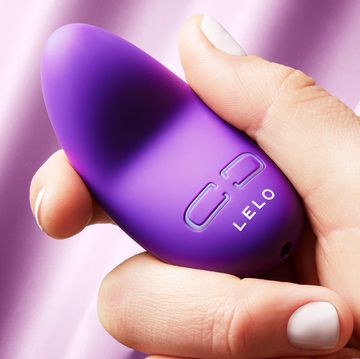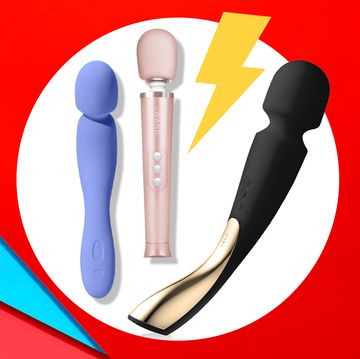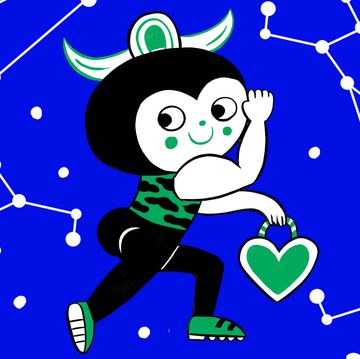Do you ever feel like one of your friends isn’t really your friend? As in, they don’t have your best interests in mind? Maybe they often diminish your wins, leave you feeling sucky about yourself after every conversation, or consistently talk negatively about you behind your back to mutual friends. It can be hard to notice the signs that a friendship is unhealthy for you, especially if you’ve been “friends” for a long time. So, how can you tell if your bestie is ride-or-die or, well, quite the opposite (ahem, faker than boxed macaroni and cheese)?
In a fake friendship, you’re “consistently giving more than you get,” says Rachel Miller, LMFT, a therapist based in Chicago. In other words, it “feels unbalanced,” she says. While Miller admits that friendship is not about scorekeeping, and there are certainly times where you may let down or disappoint a friend—whether intentionally or unintentionally—“with quality friends, the give and take will feel like it naturally works itself out over the lifetime of the friendship.”
And if it doesn’t? “That’s an indication that one of you may be more invested than the other,” she explains.
Meet the Experts:
Rachel Miller, LMFT, is a Chicago-based therapist and founder of Hold The Vision Therapy.
Blake Blankenbecler, LPC, is a licensed therapist and friendship educator based in Charleston, South Carolina.
Melanie Ross Mills, PhD, is a licensed temperament therapist, relationship and friendship expert, motivational speaker, and author of The Friendship Bond.
Emily Maynard, LMFT, is a licensed marriage and family therapist serving clients in California and Florida.
Leanna Stockard, LMFT, is a licensed therapist with LifeStance Health based in Manchester, New Hampshire.
For many people who have encountered a one-sided friendship, it can be difficult to understand how you didn’t see the signs of a phony pal. But, to ensure you don’t get blindsided by a toxic friend and can invest in quality friendships going forward, Women's Health tapped licensed therapists and friendship experts to outline some signs of a fake friend and what to do if you find yourself in a friendship that’s more hurtful than fulfilling.
What is a “fake” friend?
In a nutshell, a “fake” friend is someone who doesn’t have your best interests at heart. They aren’t willing to compromise on important matters, show little concern for your needs, and put little to no effort in maintaining the bond. “In a fake friendship, you’re often left feeling like you’re doing all of the work to maintain the friendship,” says licensed therapist and friendship educator Blake Blankenbecler, LPC. “And when you bring up this pattern to your friend, you get dismissed by them.” Why? “A fake friend is only going to be interested in doing what they want to do and will rarely think of the interests of others,” she adds.
On the other hand, a quality friend is someone who supports and values you as a person, says friendship expert Melanie Ross Mills, PhD. They’ll care about your interests and even share some of them. “They are not perfect and will need grace, but they will offer depth, authenticity, and mutual exchanges as you share life together,” she adds.
What are some signs of a fake friend?
To help figure out whether or not you're paling around with a bogus bestie, here are some signs to look out for, according to the experts:
1. You frequently feel confused.
If you're often unsure about where you stand in this friendship, that’s a solid sign that something is off, says Emily Maynard, LMFT, a licensed therapist based in Orange County, California. “If you’re spending a lot of time talking about this certain dynamic with someone [else], worrying about what [this friend] thinks, constantly feeling left out, or fixated on their social media posts to figure out where you stand, you might be stuck in a toxic friendship,” Maynard explains.
2. They often showcase signs of jealousy.
If your friend seems to get upset when good things happen to you or when you make your own life decisions different from theirs, that can be a sign of a fake friendship, Maynard says. “Jealousy is a normal feeling in relationships, especially in times of change or growth, but it shouldn’t cause cruel behavior,” she explains. “If someone uses jealousy or stress to excuse their bad behavior rather than taking responsibility to change, they may not be a reliable long-term friend.”
3. They disregard your feelings.
If they seem to be more focused on explaining your feelings to you than expressing their own, they might be trying to control your reality, explains Maynard, which is a major red flag. “A fake friend is self-centered and acts like everyone else should think or feel just like them rather than appreciating differences,” she adds.
4. The relationship feels unbalanced.
A quality friendship is one where there’s a relatively even amount of give and take, and effort is put in on both sides. But as Miller previously mentioned, in a fake friendship, the relationship feels unbalanced, with you consistently giving more than you get. This might look like you being the only one consistently reaching out to make plans. Or, you always make an effort to comfort your friend during times of distress, but when you’re struggling, they belittle or completely disregard your emotions.
5. You feel “less than” after spending time together.
Time spent with friends should leave you feeling seen, heard, understood, and appreciated for who you are. If you end a hang out with a buddy feeling bad about yourself, consider why you’re feeling this way, says Miller. “It’s important to reflect on how your friend is speaking to you and about you,” she says. “Are they trying to build themselves up by tearing you down? Are they often ‘just joking’? Do they tell you that you’re too sensitive?” If so, “this kind of person is not someone who knows how to have a quality friendship,” Miller explains.
6. They get upset when you tell them “no.”
It’s really harmful when you feel like you can’t say “no” to a friend “because it creates a dynamic where you don’t feel like you have a choice in the matter,” says Blankenbecler. “And it becomes easier to just say ‘yes’ to everything than having to deal with your friend’s reaction that’s often riddled with guilt-tripping.” Newsflash: A quality friendship is driven by free choice and honesty, not fear and obligation.
7. They only reach out when they need something.
This is problematic friendship behavior because you feel like you’re being used—whether it’s for the great advice you can give, the connections you have, or the resources you know about, says Blankenbecler. “It creates a lopsided friendship where you are only useful when your friend has a need and your needs get discounted and dismissed,” she adds.
8. They leave when you’re struggling.
A friend that only shows up for the good times and suddenly disappears for the bad creates a confusing dynamic where you feel like you can only bring the positive aspects of your life to the table for fear they will pull away once you start talking about the tougher stuff. “Friendships where you can’t bring your full self to the relationship are problematic and [can] often reinforce beliefs that you’re too much and/or that your problems aren’t that bad,” says Blankenbecler. And no one wants to feel like they’re “too much” for other people to accept and love them because it’s simply not true. Good friends will stick beside you through your wins and not-so picture-perfect moments.
9. They are very critical of you.
If a friend rarely has anything good to say about you, rarely encourages you, or rarely builds you up, then they are likely a fake friend—point, blank, period. “They judge you covertly and overtly, resulting in you never feeling fully accepted by them,” says Mills. And someone who chooses to tear you down any chance they get is not someone you want in your corner.
10. They compete with you.
In other words, this friend is always trying to one-up you when something good comes your way. “They always have a better story to tell, a nicer apartment, a fancier car,” says Mills. They will always find a way to compete with you and make your wins feel less special, she adds.
11. They pick on you when you’re around others.
Quality friendships are supportive. A good friend does not feel the need to express jealousy by picking on you when you’re around other people. “This [behavior] can impact your confidence and self-esteem, wondering why they are treating you this way,” says licensed therapist Leanna Stockard, LMFT.
12. They talk about you behind your back.
It’s normal in friend groups to express your concerns for a friend when that person is not present, but usually these concerns are brought up to that friend eventually—in a safe space. But if someone’s constantly talking negatively about you to others and their reason for doing so is to bring you down rather than help you out, this is a clear sign of a fake friend. “If they’re kind to your face but talk about you behind your back to others, either tearing you down or sharing your secrets, you are not able to trust this person for what they are showing you to your face,” says Stockard. And without trust, you can’t create a healthy foundation for any type of relationship.
13. They use your secrets against you.
After disclosing something private to a friend, you should feel like you can trust them to keep it confidential. If you can’t and even have reason to believe they might share that information with other people in order to hurt you, then you might have a fake friend in your midst. “Quality friends do not use your secrets against you,” says Stockard. “You should be able to feel like a friend is a safe space.”
14. They only ever want to talk about themselves.
Again, there should be an even give and take in a friendship, especially when it comes to conversations. “Friendships involve reciprocity, and having a one-sided friendship where they only want to talk about themselves may feel more like you’re their therapist instead of a friend,” says Stockard. Sure, you should definitely hear a friend out if they’re struggling and really need support navigating a tough situation, but if you’re constantly playing therapist for a friend, then the relationship is not beneficial to you—especially if your efforts aren’t reciprocated. After all, you can’t pour from an empty cup.
15. When you have an argument, it’s really easy for them to leave.
When conflict arises, a fake friend will voluntarily exit the conversation and will not return to work things out. If they do come back, it’s only after enough time has passed and they can act like nothing happened, explains Mills. “This friend has a hard time staying in your orbit when you are struggling, hurting, maybe a little more needy because of a challenging season,” she says. And when you’re stuck between a rock and a hard place, you want to feel safe enough to confide in a friend—not fear that they’ll turn you away.
Is your bestie going through a rough patch? Here's how to support a friend struggling with their mental health:
What do I do if I find myself in a fake friendship?
Once you’ve realized you’re in a fake friendship, you might be feeling hurt and confused. First and foremost, recognize that your experience is not singular and many people may find themselves in this same situation once or twice (or, a few times) in their life.
Post-realization, you may need some time to sit with your feelings before addressing the issue—this can take a few days or even weeks. After you’ve taken a beat to process, you might be curious as to what to do next. Well, communication is key in these types of situations. Ahead, the experts share some tips on how best to proceed:
Have a conversation with this friend.
Unless you address your concerns about the friendship head on, the other person will believe that everything is going swimmingly. With that said, having such a tough convo with a friend who most likely won’t take it well isn't the easiest task.
Before diving right in, Stockard suggests deciding whether or not you believe the friendship is worth maintaining and is something that can be salvaged. “If you feel like your fake friendship can grow into a real friendship, then there is an opportunity to discuss how you’re feeling with this friend,” she says. “If they’re able to be a quality friend, they will be understanding of your feelings and work to make changes.”
But if after expressing your concerns, they get defensive and start to undermine your feelings, it might be time to call it quits. (More on that later.)
Set boundaries with them.
Boundaries are important to implement in any relationship, but especially in the case of a fake friendship where you might be getting walked over. “This may include physical, emotional, or mental boundaries,” says Stockard.
For example, if they’re a better friend when alone, you might consider only spending time with them without a large group present, says Stockard. If this friend is not good at keeping secrets, maybe set a mental and emotional boundary where you’re not sharing with them anything you don’t want disclosed to others. Or, if you don’t really feel comfortable spending one-on-one time with this person, consider limiting your hangouts to larger group functions, Stockard suggests.
How do I end a fake friendship?
If setting boundaries and doling out a second chance isn’t in the cards, you might decide to end the friendship. If it comes to that, you’ll probably want to have a conversation with them, first. “While it’s definitely a painful thing to do, it can be helpful to voice and share why this friendship isn’t something you can continue investing in and share that you wish them the best moving forward even though you will no longer be in their life,” says Blankenbecler.
To break up with a friend effectively, it’s not exactly helpful to give a laundry list of everything the other person did wrong, even if they ask why you're ending the friendship. Instead, highlight a few recurring themes and briefly explain why they are problematic and something you can’t engage with anymore, Blankenbecler suggests. For example, if this friend constantly talks negatively about you behind your back, you might explain to them that their behavior makes you feel unloved and like you can’t trust them with your secrets, and you desire a friendship where you feel appreciated and can rely on the other person to not disclose sensitive information.
When you’re having the conversation, preferably in person, “plan and stick to an end time,” says Maynard. “Don’t let yourself get stuck in an endless text chain,” or convo loop, she adds. Instead, give yourself enough time to lay out all of the points you want to make without getting distracted and straying away from the original goal.
As a last resort, or if it feels unsafe to break up with this person directly, you may decide to ghost them. “If a conversation with this friend does not seem like a viable option for you, there is also the opportunity to ghost your friend,” says Stockard. “This may include no longer responding to text messages, [rejecting] opportunities to spend time together, or even [blocking] messages on social media.”
However, with this option, Stockard warns that there may be challenges. The fake friend may not know what is going on, and why the cut off has taken place, and so if they’ve engaged in talking badly about you behind your back or not supporting your decisions in the past, they may continue to engage in these behaviors with your mutual friend group.
If this happens, the best course of action may depend on how the fake friend has historically responded to boundary setting. “One option to address the new issue is to end the ghosting. Let your fake friend know why you made your decision to ghost them, and ask them to no longer speak about you negatively to your mutual friends,” says Stockard. “However, since they are a fake friend, they may or may not listen to this instruction.” So, your second option is to address the mutual friend group directly, Stockard adds. Ask them to not engage in any negative talk about you instigated by the fake friend, not disclose any information about you, how you are doing, or why you have cut off this friend, she suggests.
At the end of the day, you want to surround yourself with people who build you up and help you become the best version of yourself. If you find yourself in a situation with a fake friend, then it’s worth considering whether or not it’s beneficial for you to keep this person in your life. If you’re solely keeping them around because it’s comfortable, convenient, and familiar, that’s typically not the best reason to maintain any relationship, let alone a friendship. You owe it to yourself to have a social support network made up of meaningful connections and people you can trust and confide in.
Casey Clark is a freelance journalist who specializes in beauty, health, and style-related commerce content. She graduated from Hofstra University with a degree in journalism. Her work has been published in Women's Health, Forbes, Better Homes & Gardens, and more.













